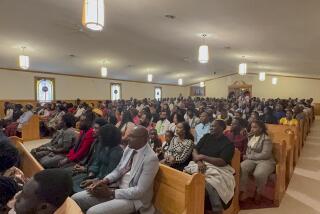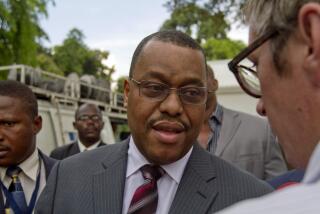A Reluctant Candidate Rises in Haiti
- Share via
PORT-AU-PRINCE, Haiti — With one presidential term behind him and his campaign for a return to power undertaken with reluctance, Rene Preval has made clear he has no illusions about the daunting challenges that lie ahead for the next leader of Haiti.
Torchbearer for the unfulfilled aims of his predecessor and ally, Jean-Bertrand Aristide, Preval may be uniquely positioned to re-energize the exiled president’s followers in the thwarted mission of empowering the poor and steering this most backward of Western nations out of its historical rut of violence, illiteracy and injustice.
Four days into counting the vote intended to restore elected leadership to chaotic Haiti, Preval appeared likely to win a slight majority in the first-round voting, setting the stage for him to take the reins of this troubled country late next month.
Preval, the son of a well-to-do agrarian family who would appear on the surface to have more in common with the business class that was Aristide’s archenemy, was dragged into the race by rural peasants who argued he was their sole hope for economic and political salvation. That has separated the 63-year-old agronomist from more than 30 other willing contenders and cast him as the candidate motivated by aspirations for a more equitable Haiti rather than the mere trappings of power.
As with his first stint as president from 1996 to 2001, a tenure that may have been most notable for the fact he was able to complete it, Preval promised voters little more than an honest effort.
The theme of his low-profile campaign was the tamping down of expectations once raised by Aristide, who served as president before and after Preval’s first term.
“I don’t want burning tires in the streets. I don’t want barricades. I don’t want insecurity,” he said in an interview before Tuesday’s election. “But we will have all that unless we are honest with the people. They have to trust you and know that you respect them enough to tell them the truth. The worst thing a leader can do is lie.”
Preval said he agreed to come out of self-imposed retirement from politics in his northern homestead after supporters said he was needed “because I’m not a politician.”
What Haiti needs instead of traditional power-hungry and fractious figures, he said, is a dispassionate manager who will recruit the necessary expertise in institution-building to give Haitians faith that they can end a legacy of desperation, which has sent waves of illegal immigrants to U.S. shores and transformed teeming slums into criminal havens.
Trying to achieve social peace, judicial reform, economic growth and efficient use of foreign aid will require technical expertise that Preval said he would seek irrespective of past political affiliations.
With his Lespwa movement unlikely to win a majority in the two-house legislature, Preval, whether he wins outright or after a March 19 runoff, would have to include other political forces in his government to make any progress toward breaking Haiti’s centuries-old standoff between rich and poor.
“I have friends in both the bourgeoisie and in Cite Soleil,” he said, referring to the long-divided business elite of which he has been a part and the impoverished slum-dwellers who supported Aristide.
Preval has declined to specify political parties or individuals he hopes to bring into his Cabinet, should he win the presidency. But a senior aide who spoke on condition he not be identified said Preval was committed to national reconciliation and would reach out to those among his challengers who have skills vital to rebuilding Haiti.
Preval galvanized the masses by example of his own entrepreneurial success and by declining to disabuse Aristide supporters of their belief that his triumph would pave the way for the exiled populist to return to Haiti.
Preval is the only elected Haitian head of state ever to have served his full term and peacefully left office. He retreated to his family’s estate in the northern town of Marmalade, where he organized agrarian cooperatives producing coffee and orange juice, built a school and Internet center and bankrolled a bamboo furniture factory and a 50-piece orchestra.
“When 1,000 peasants came to me on July 27, 2005, and told me I would be a traitor if I didn’t agree to be their candidate for president, I had to go along,” he said.
Preval said he saw a hunger for change among his fellow Haitians and broad desire to carry out the kind of rural development that transformed his own town of 12,000, but he conceded such success would be difficult to achieve on a national level.
“We won’t have success on the magnitude we have in Marmalade,” he said. “But it’s important to note that the most important ingredient isn’t money, it’s will, and we have that in abundance.”
Although not a member of Aristide’s Lavalas Family party, Preval nevertheless appealed to the exiled president’s supporters as their best hope in a country where a few hundred wealthy families have wielded power since a slave rebellion overthrew French colonialism 202 years ago. Half of Haiti’s 8.5 million people are illiterate, at least 70% are unemployed and most families scrape by on incomes from farming or street vending of less than a dollar a day.
Preval was allied with Aristide during the heady days that followed 30 years of the father-son Duvalier dictatorship, backing the ex-priest in this country’s first democratic elections in 1990. Preval joined Aristide in exile after a 1991 military coup and returned to Haiti with the 1994 U.S. military invasion that restored Aristide to power. Backed by Aristide and Lavalas, he won the presidency for the five-year term during which Aristide was constitutionally ineligible.
By retaining Lavalas officials and seldom deviating from Aristide’s populist programs, Preval gave many the impression that Aristide was the real power behind his office. His last two years as president saw assassinations and a corruption-tainted election, leaving a stain on an otherwise unremarkable record.
Preval has been vague about his attitude toward Aristide’s possible return from exile in South Africa, saying only that Haiti’s constitution makes no provisions for a citizen’s exile. He has also been cryptic about his plans for resolving the fate of several jailed figures from Aristide’s political orbit. Former Prime Minister Yvon Neptune has been in the penitentiary since June 2004, accused by the interim government of complicity in a massacre of Aristide opponents during the February 2004 rebellion in which Aristide left the country under U.S. escort.
The one promise Preval has made is to work for a constitutional amendment to allow Haitians with dual nationality to run for office here. Two Haitian emigres with U.S. citizenship and success in business, Texas food-processing tycoon Dumarsais Simeus and Florida investment banker Samir Mourra, were barred from this election because the 1987 constitution prohibits dual nationals from high office. Haiti needs all the expertise it can get from Haitians both here and abroad, Preval said.
Mild-mannered and less prone to the fiery oratory employed by Aristide, Preval is expected to maintain better relations with Washington than did his deposed ally. He pointed out that his administration had collaborated well with the Clinton White House and said he had no reason to expect difficulties with the Bush administration.
Although Preval and Aristide share a leftist political orientation, Preval has distanced himself from his mentor’s liberation theology that fanned the embers of a long-smoldering class war by targeting the rich.
“We don’t want to go to the villas of the bourgeoisie,” Preval said. “We want to improve our own conditions, little by little.”
Williams is a Times staff writer and Regnault is a special correspondent.
More to Read
Sign up for Essential California
The most important California stories and recommendations in your inbox every morning.
You may occasionally receive promotional content from the Los Angeles Times.











